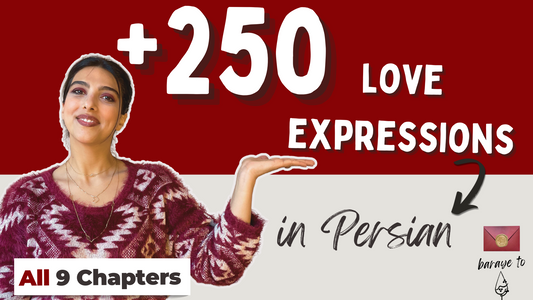How One Word Opens Many Doors: The Persian Secret of «خوش» (khosh-)
Grammar + culture + poetry — the ShirinSchool way 💌
That’s me in Chahārshanbe Souri چهارشنبهسوری, jumping over fire — and yes, totally khoshhal (خوشحال)! — happy, fiery, and ready to talk about the word khosh- itself. Seems appropriate, right? 🔥💃”
khosh- (خوش) is one of Persian’s most charming building blocks. It originally meant “pleasant / good / sweet,” and in modern Persian it behaves like a productive combining form — attach it to a word, and the meaning becomes pleasantly something: happy, fortunate, tasty, beautiful… Once you feel this pattern, dozens of words click into place naturally.
Quick vibe Think of khosh- as Persian sunshine: whatever it touches becomes warm, sweet, or pleasant. 🌞
Grammar feel (light & friendly)
In modern usage, خوش khosh- acts like a prefix, though historically it’s an adjective. When combined with another word, it adds the sense “pleasantly / nicely / well- / fortunately.”
خوش آمدی! (khosh āmadi) → Welcome! — literally “you came pleasantly.”🚪🚶🏽
Flip it with «بد» (bad-)
Persian loves balance. Many khosh- words can be flipped with bad- (بد) to mean the opposite:
خوشمزه (khoshmazze) → tasty | بدمزه (badmazze) → not tasty / unpleasant (also used for “lame” jokes 😄)
Poetry moment (Rumi):
«جفتِ بَدحالان و خوشحالان شدم»
joft-e badhālān o khoshhālān shodam → “I became one with both the sorrowful and the joyful.” Here, حال (hāl) means state / mood (it’s also “present tense” in grammar). So بدحال means “in a bad state,” not simply “sad.”
Core family of خوش- words (learn these first)
| Persian (RTL) | Transcription | Meaning | Notes |
|---|---|---|---|
| خوشحال | khoshhāl | happy, delighted | حال (hāl) = mood/state. Opposite: بدحال (badhāl). |
| خوشبخت | khoshbakht | fortunate, blessed | بخت (bakht) = fate/fortune. Deep, serene “fortunate,” not just casual luck. More on khoshbakht → |
| خوشگل | khoshgel | beautiful, pretty | Colloquial Persian; literally “pleasant-looking.” All about khoshgel → |
| خوشمزه | khoshmazze | tasty, delicious | مزه (mazze) = taste/flavor. Opposite: بدمزه (badmazze). |
| خوشصدا | khoshsedā | having a beautiful voice | صدا (sedā) = voice/sound. |
| خوشسفر | khoshsafar | pleasant traveler / good to travel with; easy trip | سفر (safar) = journey/travel. |
| خوشصحبت | khoshsohbat | pleasant to talk to, good conversationalist | صحبت (sohbat) = conversation/talk. |
| خوشوقت | khoshvaght | glad/delighted (polite/formal) | Common in greetings: از آشنایی با شما خوشوقتم — “Pleased to meet you.” |
Wedding wish you can use today
خوشبخت بشین، ایشالا — Khoshbakht beshin, ishāllā → “May you be fortunate (God-willing).”
Romantic everyday version: با تو خوشبختم — Bā to khoshbakhtam → “I’m fortunate with you.”
Pronunciation tip Want to polish the Persian kh (خ) sound? Watch the short guide and practice the final drill: kh-sound tutorial →
Practice: make your own sentences
- Bā to khoshbakhtam, azizam.
- Kheyli khoshhālam emruz. (I’m very happy today.)
- In ghazā khoshmazze-st! (This food is tasty!)
- U khoshsedā-st — sedā-ye ghashangi dāre. (They have a beautiful voice.)
Try the “bad-” flips
- بدحال (badhāl) ↔ خوشحال (khoshhāl)
- بدمزه (badmazze) ↔ خوشمزه (khoshmazze)
- بدبخت (badbakht) ↔ خوشبخت (khoshbakht)
With gratitude and Love- Shirin
با سپاس و مهر- شیرین




